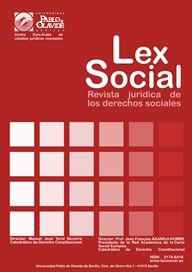Función social de la propiedad, vivienda adecuada y derecho internacional de los derechos humanos
DOI:
https://doi.org/10.46661/lexsocial.8138Palabras clave:
vivienda adecuada, derechos económicos, sociales y culturales (DESC), derecho internacional de los derechos humanos (DIDH), derecho a la propiedadResumen
Este artículo analiza el valor añadido de un enfoque amplio de los derechos humanos con el fin de obtener un mayor equilibrio en la relación entre el derecho a la vivienda adecuada del arrendatario y el derecho a la propiedad del arrendador. En primer lugar, el artículo brevemente expone de qué forma los tratados de derechos humanos y los órganos internacionales sobre derechos económicos, sociales y culturales (DESC) han abordado, o decidido no abordar, el derecho a la propiedad. Segundo, introduce el derecho a la vivienda tal y como es proclamado en el derecho internacional de los derechos humanos. En tercer lugar, defiende que la comunidad de derechos humanos, particularmente la dedicada a los DESC – entre los que se encuentra la vivienda – debería prestar más atención al derecho a la propiedad. Finalmente, el texto articula los comienzos de una propuesta para reinterpretar el derecho a la propiedad y su función social desde una óptica holística de los derechos humanos, que debe tomar en serio el derecho a la vivienda y otros derechos socioeconómicos.
Descargas
Citas
CASLA, K., "Rights and Responsibilities: Protecting and Fulfilling Economic and Social Rights in Times of Public Health Emergency", in Covid-19, Law and Human Rights: Essex Dialogues (FERSTMAN, C. & FAGAN, A., eds, University of Essex, 2020).
CASLA, K. "Unpredictable and Damaging? A Human Rights Case for the Proportionality Assessment of Evictions in the Private Rental Sector", European Human Rights Law Review, 2022(3).
CASLA, K., "The Right to Property Taking Economic, Social and Cultural Rights Seriously", Human Rights Quarterly, 2023, 45(2). https://doi.org/10.1353/hrq.2023.0010
DUGUIT, L., Les Transformations Générales du Droit Privé Depuis le Code Napoléon (Librairie Félix Alcan 1912).
DURANTI, M, The Conservative Human Rights Revolution: European Identity, Transnational Politics, and the Origins of the European Convention, Oxford University Press, 2017. https://doi.org/10.1093/acprof:oso/9780199811380.001.0001
EPSTEIN, R., "The plasticity of property: legal transitions between property rights regimes for different purposes", en The Changing Role of Property Law (NORDTVEIT, E., ed, Edward Elgar, 2023).
FOSTER, S.R. y BONILLA, D., The Social Function of Property: A Comparative Perspective, Fordham Law Review, 2011, 80.
MILANOVIC, B., Capitalism, Alone, Harvard University Press, 2019. https://doi.org/10.4159/9780674242852
O'CINNEIDE, C., "The Potential and Pitfalls of Intersectionality in the Context of Social Rights Adjudication", en Intersectionality and Human Rights Law (ATREY, S. y DUNNE, P., eds, Hart, 2020).https://doi.org/10.5040/9781509935321.ch-003
ROSEVEAR, E., HIRSCHL, R. y JUNG, C., "Justiciable and Aspirational Economic and Social Rights in National Constitutions," en The Future of Economic and Social Rights (YOUNG, K., Cambridge University Press, 2019). https://doi.org/10.1017/9781108284653.003
WILSON, S., "Litigating housing rights in Johannesburg's inner city: 2004-2008", South African Journal on Human Rights, 2011, 27(1). https://doi.org/10.1080/19962126.2011.11865008
Descargas
Publicado
Cómo citar
Número
Sección
Licencia
Derechos de autor 2023 Koldo Casla

Esta obra está bajo una licencia internacional Creative Commons Atribución-NoComercial-CompartirIgual 4.0.
-
Atribución — Usted debe dar crédito de manera adecuada, brindar un enlace a la licencia, e indicar si se han realizado cambios. Puede hacerlo en cualquier forma razonable, pero no de forma tal que sugiera que usted o su uso tienen el apoyo de la licenciante.
-
NoComercial — Usted no puede hacer uso del material con propósitos comerciales.
-
CompartirIgual — Si remezcla, transforma o crea a partir del material, deberá difundir sus contribuciones bajo la misma licencia que el original.


 Lex Social
Lex Social

 @lexrevista.bsky.social
@lexrevista.bsky.social


